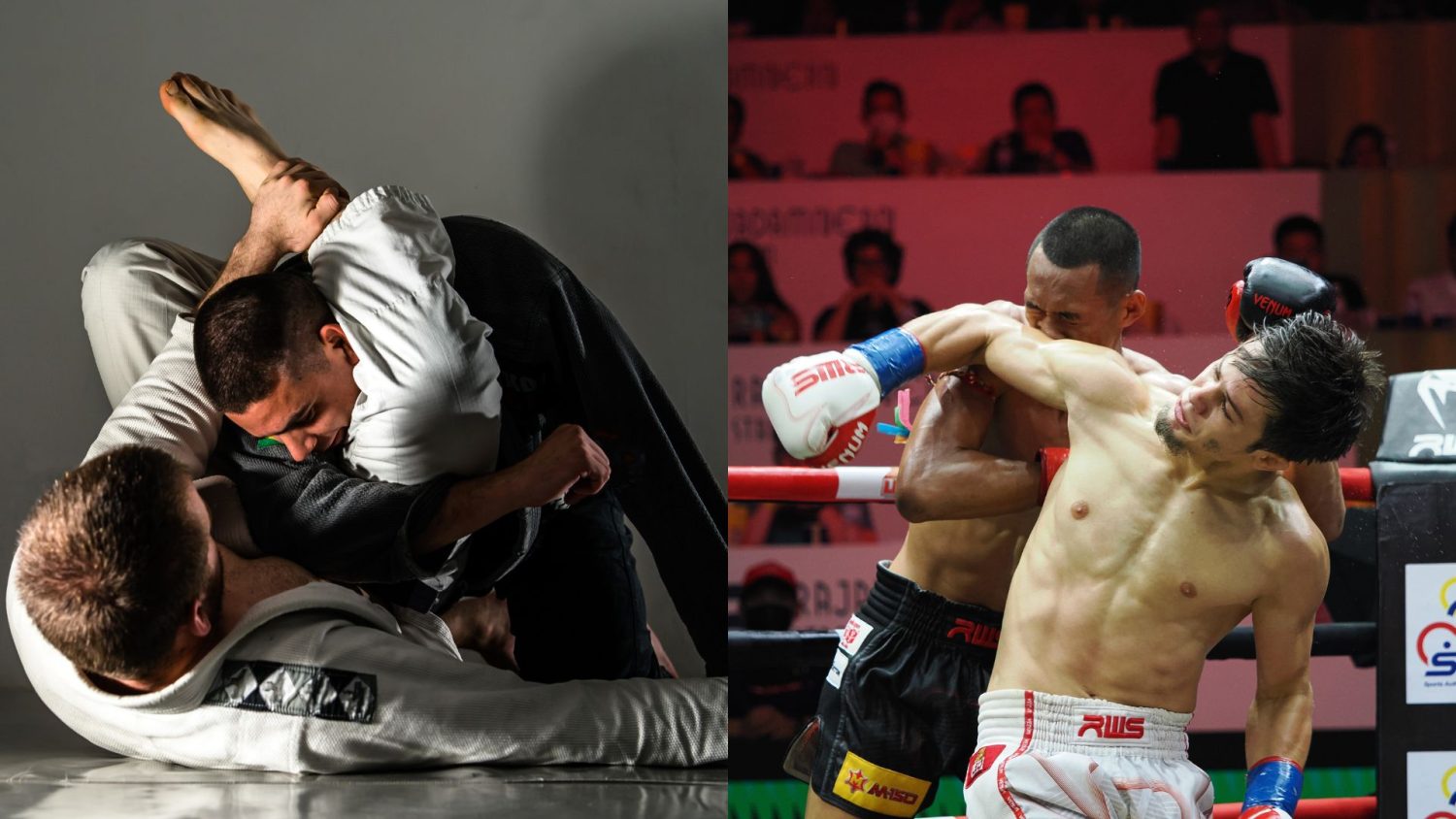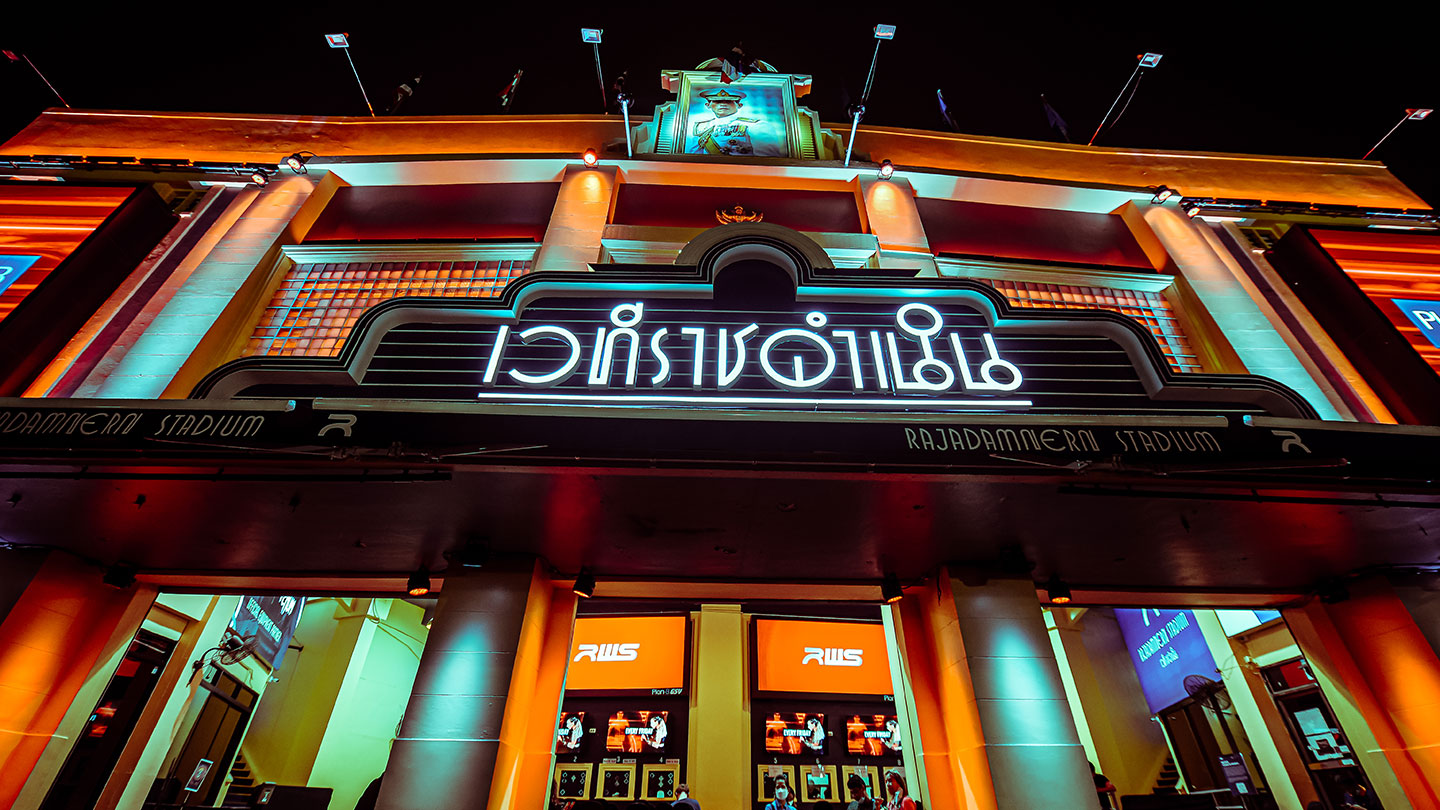Explore the differences between Muay Thai and Jiu Jitsu. From techniques to training, discover which martial arts suit your goals best.
Apr 19, 2024
Muay Thai vs Jiu Jitsu: Which One is More Effective?


Muay Thai and Jiu Jitsu are two distinct and highly effective martial arts disciplines, each with its own unique origins and characteristics. Muay Thai, also known as Thai boxing, is a striking art that originated in Thailand and is known for its powerful kicks, punches, elbows, and knee strikes. On the other hand, Jiu-Jitsu, originating from Japan and later popularized in Brazil, is renowned for its ground fighting techniques and the ability to neutralize larger, stronger opponents through skillful manipulation and control.
In this Muay Thai vs Jiu Jitsu article, we will delve into their comparison and find out whether Muay Thai or Jiu Jitsu is better by exploring the strengths and advantages of each art form and considering the contexts in which they excel.
Training Methods and Philosophies

In Muay Thai academies, training methods emphasize building explosive power, endurance, and technique through rigorous pad work, bag drills, and sparring sessions.
The art emphasizes striking, clinching, and the skillful use of the “eight limbs” (fists, elbows, knees, and shins), cultivating a well-rounded approach to stand-up combat. There’s a strong focus on conditioning, as practitioners work to develop strong, impactful strikes and precise defensive maneuvers.
Conversely, in Jiu-Jitsu academies, training revolves around learning and mastering ground fighting techniques, submissions, and positional dominance. The philosophy is centered on using leverage and technique to overcome larger opponents, making it an art form that emphasizes patience, strategy, and control. Practitioners engage in live sparring sessions, often referred to as “rolling,” to test and refine techniques in a controlled environment.
Applications in Self-Defense and Competition

In practical self-defense scenarios, Muay Thai’s emphasis on striking and stand-up clinch work provides practitioners with the ability to effectively defend themselves in close-quarters situations. The art’s conditioning and offensive techniques enable practitioners to swiftly neutralize threats or attackers. Additionally, Muay Thai’s proficiency in utilizing elbows, knees, and kicks can provide quick and powerful responses to potential assailants.
Conversely, Jiu Jitsu’s focus on ground fighting and submission techniques is highly effective in self-defense situations, especially when dealing with larger or stronger opponents. Jiu Jitsu’s mastery of positional control and joint locks empowers practitioners to subdue assailants without relying on strikes, making it an invaluable skill set for self-protection.
In competitive settings such as tournaments, MMA fights, or street fights, the effectiveness of Muay Thai shines in stand-up striking exchanges. Its powerful techniques and conditioning make it a formidable style in both point-based martial arts tournaments and the dynamic environment of MMA bouts.
Similarly, Jiu Jitsu’s grappling expertise and submission prowess have been proven effective in high-level competitions, as well as providing a crucial skill set for MMA fighters who need to excel in ground combat.

Physical and Mental Benefits

Both Muay Thai and Jiu Jitsu stand out not only for their combat effectiveness but also for the profound physical and mental benefits they offer to practitioners. Each discipline contributes uniquely to the overall well-being of individuals, fostering physical fitness, mental discipline, confidence, and stress relief.
Muay Thai and Jiu Jitsu’s Physical Benefits
Muay Thai and Jiu Jitsu offer practitioners not only effective self-defense techniques but also a myriad of physical benefits. Each discipline provides a unique approach to enhancing the body’s capabilities, from cardiovascular endurance to strength and agility. In this exploration, we delve into the distinct physical advantages Muay Thai and Jiu Jitsu bring to those who commit to their training.
Muay Thai’s Physical Benefits
- Cardiovascular Endurance: The constant movement, rapid strikes, and clinch work enhance cardiovascular health, improving stamina and endurance over time.
- Muscle Strength and Tone: Powerful kicks, knee strikes, and clinch maneuvers engage various muscle groups, leading to increased strength and toned muscles.
- Agility and Coordination: The intricate footwork and rapid combination of strikes enhance agility and coordination, crucial elements for effective martial arts performance.
Jiu Jitsu’s Physical Benefits
- Functional Strength: Jiu-Jitsu emphasizes leverage and technique over brute force, promoting functional strength that allows practitioners to overcome larger opponents.
- Flexibility: Ground-based maneuvers and submission attempts require flexibility, encouraging practitioners to develop a broad range of motion.
- Core Stability: Constant engagement of the core muscles during ground control and submission attempts contributes to improved core stability.
Muay Thai and Jiu Jitsu’s Mental Benefits

Beyond the physical benefits, both Muay Thai and Jiu Jitsu offer practitioners a profound journey of mental development. Let’s unveil the unique aspects of each martial art that contribute to sharpening the mind and fortifying mental resilience.
Muay Thai’s Mental Benefits
- Focus and Concentration: The need for split-second decision-making during fast-paced exchanges sharpens focus and concentration.
- Confidence Under Pressure: Sparring sessions and live drills build the confidence to face challenges, teaching practitioners to stay composed under pressure.
- Discipline and Respect: The traditional aspects of Muay Thai training, including rituals and respect for instructors and training partners, instill discipline and humility.
Jiu Jitsu’s Mental Benefits
- Problem-Solving Skills: Jiu-Jitsu encourages strategic thinking and problem-solving on the mat, as practitioners must adapt to their opponent’s movements.
- Patience and Persistence: The intricate nature of ground grappling teaches patience and persistence, as practitioners work towards achieving dominant positions or submissions.
- Emotional Control: The controlled environment of Jiu Jitsu training helps develop emotional control, teaching practitioners to manage frustration and remain composed in challenging situations.
Additionally, both Muay Thai and Jiu Jitsu contribute significantly to practitioners’ overall well-being, such as;
- Confidence Boost: Mastering the techniques and overcoming challenges in martial arts enhances self-confidence, both inside and outside the gym.
- Stress Relief: The physical intensity of Muay Thai workouts and the problem-solving aspects of Jiu Jitsu serve as effective outlets for stress, providing a healthy means of releasing tension.
The physical and mental benefits of Jiu Jitsu vs Muay Thai are multifaceted, offering practitioners a holistic approach to health, discipline, and personal development. The choice between the two ultimately depends on individual preferences, goals, and the desired blend of physical and mental attributes.
Muay Thai vs Jiu Jitsu: Which One is Better?

Choosing between BJJ vs Muay Thai is a decision that hinges on personal preferences, fitness goals, self-defense needs, and the desired skill sets of individuals.
Here are some guidelines to assist individuals in making an informed decision
- Personal Preferences: Consider your preference for techniques. Muay Thai offers a dynamic spectrum with punches, kicks, elbows, and knees, emphasizing stand-up combat.
In contrast, Brazilian Jiu-Jitsu focuses on ground-based combat, submissions, and strategic grappling. - Fitness Goals: Assess your fitness objectives. Muay Thai’s dynamic sessions provide a comprehensive full-body workout, catering to holistic physical challenges.
Jiu-Jitsu emphasizes functional strength, flexibility, and core stability, contributing to overall fitness with adaptability. - Desired Skill Sets: Contemplate your desired skill sets. Muay Thai refines stand-up striking and close-quarters combat, providing versatility in offensive and defensive techniques.
Jiu-Jitsu emphasizes ground control, positional dominance, and submission grappling, offering a strategic and adaptive approach to combat situations.
While both martial arts have unique strengths, Muay Thai often stands out as a better option for those seeking a dynamic and versatile approach to martial arts training and competition for several reasons as follows;
- Versatility: Muay Thai offers a versatile skill set that encompasses both striking and clinch work, providing a well-rounded approach to stand-up combat.
- Real-world Application: The striking techniques in Muay Thai can be immediately applicable in real-world self-defense situations, where quick and powerful strikes may be necessary.
- Physical Conditioning: Muay Thai’s high-intensity workouts contribute significantly to cardiovascular health, muscle strength, and overall physical conditioning.
Conclusion
In summary, while Brazilian Jiu-Jitsu and Muay Thai differ significantly in their approach to combat, both martial arts share common ground in fostering overall well-being. Muay Thai’s emphasis on dynamic striking techniques, including punches, kicks, elbows, and knees, contrasts with Jiu Jitsu’s focus on ground-based combat and strategic grappling for submissions. However, both disciplines contribute substantially to physical fitness, mental discipline, and self-defense capabilities.

For enthusiasts captivated by the dynamic world of Muay Thai, don’t miss the opportunity to witness live matches at Rajadamnern Muay Thai Stadium.
Book the ticket for your seat on our website now to immerse yourself in the vibrant atmosphere of Muay Thai traditional martial arts.

Related News

Muay Thai vs Boxing: Differences, Techniques, Training Compared
Apr 13, 2024
Discover the contrasts between Muay Thai and Boxing. From techniques to training, explore which combat sport suits your goals best.







